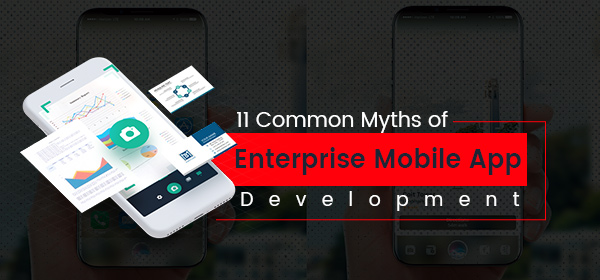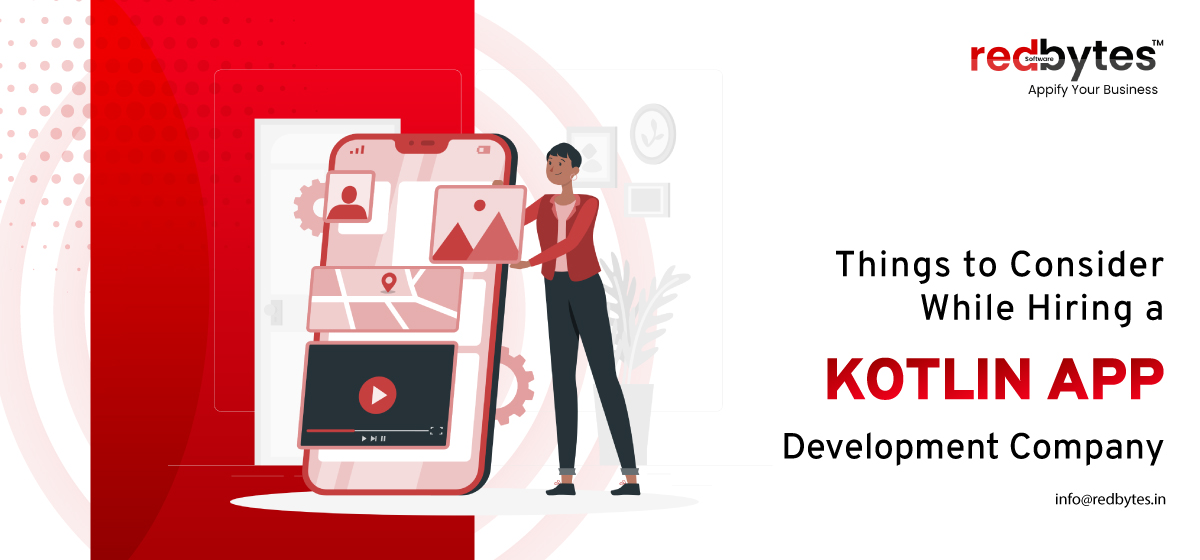Despite facing a lot many challenges while developing Enterprise mobile apps, corporate companies and startup entrepreneurs are all zealous about the idea of building diverse mobile apps to boost business growth and reach maximum customers.
The famous fact that mobile apps are perfectly integrated into human life as an integral part has inspired myriad of organizations to shift to enterprise mobility.

There is a lot to leverage when an enterprise considers developing a mobile app. For once, these apps are keys to creating a brand and spreading brand awareness. If built strategically, they can even bring repeat business, earning great amount of ROI.
Still, there is a few that shows sincere interest in having a dedicated mobile app for business engagement. The reason is numerous misconceptions surrounding the concept of enterprise mobile app development.
To help organizations focus on mobile-first approach, here are 11 common myths that can be debunked for business success.
1. Enterprise mobility apps consume a lot of time to develop
There is a pseudo buzz in the app industry that mobile apps intended for enterprise mobility has much larger time span for development than normal apps. Some even harbor this prejudice that the project may take at least half a year.

This is a wrong thought. If you are clear with your mobile app vision and want to create multiple apps dedicated to various business units, the time required to develop them doesn’t necessarily exceed expectations.
All they need is a right mobile app development partner and accurate decisions on highly integrated platforms that help accelerate the process.
If everything falls in the right place and resources are utilized smartly, you can build high-quality business app in as little as 90 days.
2. Cost and intricacy are the biggest barriers
Enterprise companies who are emerging to be on top are often concerned about whether or not to juggle with investment.
Worries about cost of mobile app development daunt them and they eventually give up on the idea or settle instead for a mediocre build.
Another element is the involvement of complexities. Though it is true that more intricate the app is, more it may cost.
Read also : How Much Does it Cost to Market an App?
However, there are many Venture Capitalists and online crowd fund sources available to give your projects a little better push.
The return acquired in terms of growth and customer acquisition is much bigger than investment made, which indicated satisfying ROI.

3. It is all about coding, nothing else
This is not true at all. People outside the domain of app development happens to believe that developing an enterprise mobile app just involves coding and the app success revolves around how better you code.
But this is not just what is needed, coding is a basic requirement; however the approach takes a lot more efforts and considerations for fulfillment of the project.
Other than this you also need talented resources, technologies, an idea, design evaluation and graphics, and of course, not to forget, exceptional user experience.
4. Mobile cloud apps are not a pragmatic choice from business perspective
Mobile cloud is the approach in enterprise app development that often confronted strong criticism believing that it is not feasible or achievable.
Apps and cloud do not fit perfectly well due to undesirable reason of compatibility as said by mobile app strategists. However, in reality, this is opposed to the actual scenario.

In fact, a lot of organizations will implement mobile cloud applications tailor-made for businesses.
Cloud provides assurance that developers can dispense without concerns of physical data storage, which means mobile cloud is actually quite a pragmatic choice especially for enterprises.
5. End users should not be considered thoroughly during the development process
This is a typical misconception that end users do not play a significant role in the core app development process.
Businesses develop apps usually to simplify the operational processes and serve end users at different level better.
Read also : How To Market an App Successfully
Thinking that these end users only come to play a part at the end of the process will be a catastrophic fallacy. Hence, it is important to keep them in loop during the process.
After all, considering and incorporating user expectations is the best way to make your app thrive and be usable.
6. Enterprise apps do not ensure uncompromised security
Another prevalent mythical thought across enterprise mobility industry is increasing the danger of safety by establishing collaboration among employees through mobile apps.
The question of security irrationally intimidates enterprise companies, making them deterred for opting mobility solutions.
The fear of security has a lot to do with the early days of mobile app development when building or using mobile apps meant opening your personal data to malicious hackers.
Nowadays security standards for mobile app companies have evolved and become more sophisticated and immune to vulnerability.
7. Enterprise app development can be done in-house
Companies longing to build mobile apps for their business fall for the idea of being able to manage the entire development process in-house. However, when it comes to handling heterogeneous aspects of the project, they would fall short.
Mobile app development is more than just conceptualization, visualization and wireframe. The process often gets complicated as it contains a lot many challenges especially while implementing thoughts into action.
It requires thorough market knowledge, powerful acumen, utilization of mature skills and experience needed to leverage precious data specific to existing mobile apps.
The job is so responsible you may come across a point where a thought of giving up midway overwhelms. This is why hiring development specialists outside the organization makes great sense.
8. Mobile apps may not synchronize with legacy systems
Though it is fair to think about whether or not legacy systems can be accessed by mobile apps, the doubt proves mythical against the evolution of business-specific technologies.
Companies that make large investments in legacy software such as ERP, CRM and several others often look to developing mobile apps with a hesitation believing that it will not fit into existing group of software techs.
In reality, enterprise apps can connect with multiple backend systems using APIs like SharePoint, MySQL, Oracle, etc. enterprise-grade development services with robust API structure enables legacy system to be seamlessly accessed by mobile devices.
9. Mobility for Enterprise just means a device
In the era of cutting edge digital revolutions, there are organizations who conceive mobility as a smart device in itself that works as a tool or a gadget. The device has a few good details that stand no chance of connecting with business outcome.

That is not true. Mobility is perceived as much more than a physical tool and is an indispensable need to achieve business goals from any location anytime.
Enterprise mobility puts multiple operations into a context thereby streamlining different units to deliver business efficiency and growth.
10. Selecting a right platform is not that important
This is quite a noxious myth and can spoil the whole strategy of developing a high-quality business-specific mobile app. Considering a right platform is crucial to app success and its ability to resonate with users.
Choosing the perfect platform is important if you are planning to monetize in iOS store that enforces stringent rules. Before planning, conduct an indepth research that manifests potential target user requirements that in turn help pick the right platform (iOS and Android).
11. Enterprise apps lack compatibility with Mobile Apps infrastructure
A myth like this discourages enterprise companies to consider having a mobile app in place. They are stuck on a misconception that their back-end structure lacks compatibility with mobile apps, but that is not the case.
Organizations, in order to gain excellent results from mobile app, need to be positive about upgrading their infrastructure to dovetail seamlessly with the mobile app backend.
For instance, bank apps allow customers to peek into their account status many times a day, creating a perfectly compatible system through a flawless API implementation to handle gigantic traffic rush.
Conclusion
While a few of myths discussed above are shallow, there are a few others that may raise relevant skepticism. However, not eliminating them from your vision can hurt your business potential by annihilating the entire process of enterprise app development.

With IT giants successfully integrating futuristic solutions, it is time to renounce these myths and smash other barriers that stymie the growth ahead.
Agile methodology, collaborative DevOps culture and trust in cloud solutions can eradicate these baseless notions, transform business processes and drive profitable revenue streams.





















